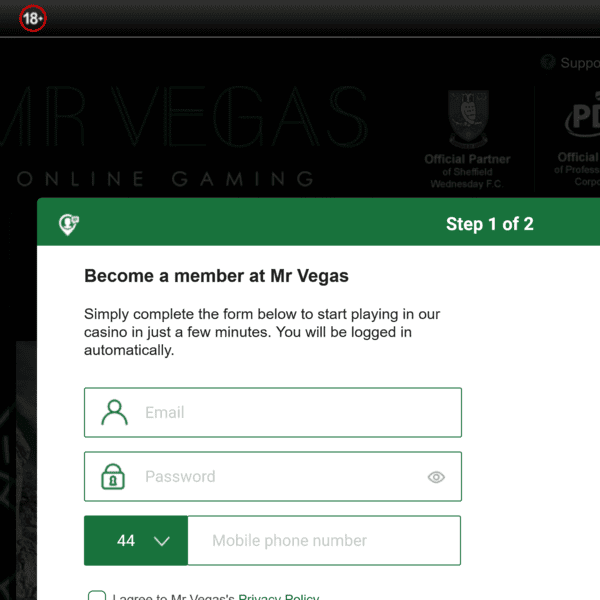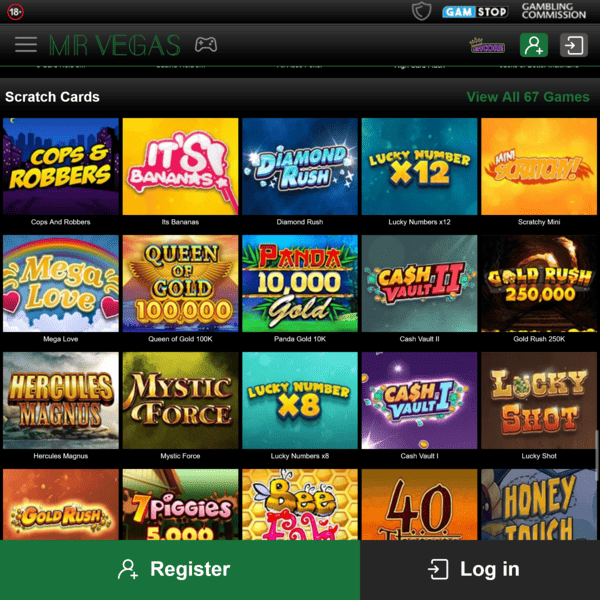Mr Vegas Registration 2025: A Secure Step-by-Step Guide
Ready to join the action at Mr Vegas? Registration is your first step into a world of top-tier gaming. As a casino expert, I can tell you that the sign-up process at a licensed UK casino is designed to be thorough for one key reason: your security. It's a hallmark of a trustworthy operator.
This page provides a clear, step-by-step guide to the 2025 registration process. I'll explain exactly what information is needed, why it's required by law, and how to complete the process smoothly. My goal is to ensure you feel confident and secure from the moment you decide to create your account.

Table of Contents
Step-by-Step Registration Guide
The registration process at Mr Vegas is streamlined and logical. It typically takes only a few minutes to complete if you have your information ready. Follow these exact steps for a smooth sign-up.
- Start the Process: Click the "Join Now" or "Register" button on the casino's homepage.
- Account Credentials: Enter your email address and create a strong, unique password.
- Personal Details: Provide your full legal name, date of birth, and gender as they appear on your official ID.
- Contact Information: Enter your current residential address (use the postcode finder for accuracy) and a valid mobile phone number.
- Set Responsible Gaming Limits: You will be prompted to set deposit limits. I strongly advise doing this now as a best practice for safe play.
- Accept Terms & Finalise: Tick the box to agree to the Terms & Conditions and confirm you are of legal gambling age. Click the final button to create your account.
Why This Information is Required (KYC Explained)
You might wonder why you need to provide so much personal information. This is not a policy set by Mr Vegas, but a strict legal requirement from their regulator, the UK Gambling Commission (UKGC). This process is known as KYC (Know Your Customer).
The UKGC mandates KYC to:
- Prevent Underage Gambling: Verifying your date of birth is essential to protect minors.
- Combat Fraud: Confirming your identity helps prevent identity theft and the creation of fake accounts.
- Promote Responsible Gambling: Linking accounts to a single identity allows for the effective implementation of self-exclusion tools across the industry.
Comparison: Required vs. Optional Information
The registration form will have mandatory and optional fields. Understanding the difference can make the process clearer.
| Information Type | Is it Required? | Reason |
|---|---|---|
| Full Name & Date of Birth | Yes (Mandatory) | Required for age and identity verification (KYC). |
| Address & Phone Number | Yes (Mandatory) | Part of the KYC process and for account security. |
| Email & Password | Yes (Mandatory) | These are your core account credentials for logging in. |
| Marketing Preferences | No (Optional) | You can choose whether or not to receive promotional emails and texts. |
| Promo Code | No (Optional) | Only needed if you have a specific, non-standard bonus code. |
What to Do After You Register
Congratulations, your account is created! But your journey is just beginning. Here are the immediate next steps I recommend:
- Verify Your Email: Check your inbox for a verification email and click the link inside. This activates your account.
- Complete Identity Verification (KYC): You will be prompted to upload documents (like a passport and utility bill) to fully verify your account. Do this immediately to ensure there are no delays with your first withdrawal. As our Reviews often point out, this is the number one cause of payout delays.
- Make Your First Deposit: Head to the cashier, choose a payment method, and claim your welcome Promo.
- Explore the Games: Dive into the massive library of Slots or other games!
Typical Mistakes During Registration
From my experience, a few simple errors cause the most problems for new players. Avoid these and your sign-up will be flawless.
- Using Typos or Nicknames: Your details must match your official ID exactly. A typo in your name or address will cause the automatic verification to fail, leading to delays.
- Creating a Weak Password: Using "Password123" is a recipe for disaster. Create something strong and unique.
- Forgetting Your Details: Forgetting which email you used can be a headache. If you do, don't create a new account; instead, get help through the Login page.
Expert Verdict on the Registration Process
My professional assessment is that the Mr Vegas registration process is exactly what it should be: secure, compliant, and thorough. A casino that lets you sign up with minimal information is likely operating without a UKGC licence and should be avoided at all costs. The process here is a sign of legitimacy, not an inconvenience.
The procedure is particularly smooth on the dedicated mobile App, which can sometimes even pre-fill information for you, making it my recommended platform for getting started. The emphasis on setting limits from the outset also demonstrates a strong commitment to responsible gaming.

Registration FAQ
Here are answers to other common questions about creating an account at Mr Vegas.
| How long does registration take? | The form itself takes about 2-3 minutes to fill out. The subsequent document verification is usually completed within a few hours. |
| Do I have to deposit money to register? | No, registration is completely free. You do not need to deposit funds until you are ready to play for real money. |
| Is it safe to provide my personal details? | Yes. Mr Vegas uses SSL (Secure Socket Layer) encryption, the same technology used by banks, to protect all data transmitted between you and the site. |
Explanation of Registration Terms
Understanding this terminology is key to feeling confident in the process.
- KYC (Know Your Customer): The mandatory process, required by law, where a casino must verify the identity and address of its customers to prevent fraud.
- UKGC (UK Gambling Commission): The official government body that regulates all commercial gambling in Great Britain. Their logo on a site is a sign of safety and legality.
- SSL (Secure Socket Layer) Encryption: A standard security technology for establishing an encrypted link between a web server and a browser. It ensures that all data passed between them remains private and integral.